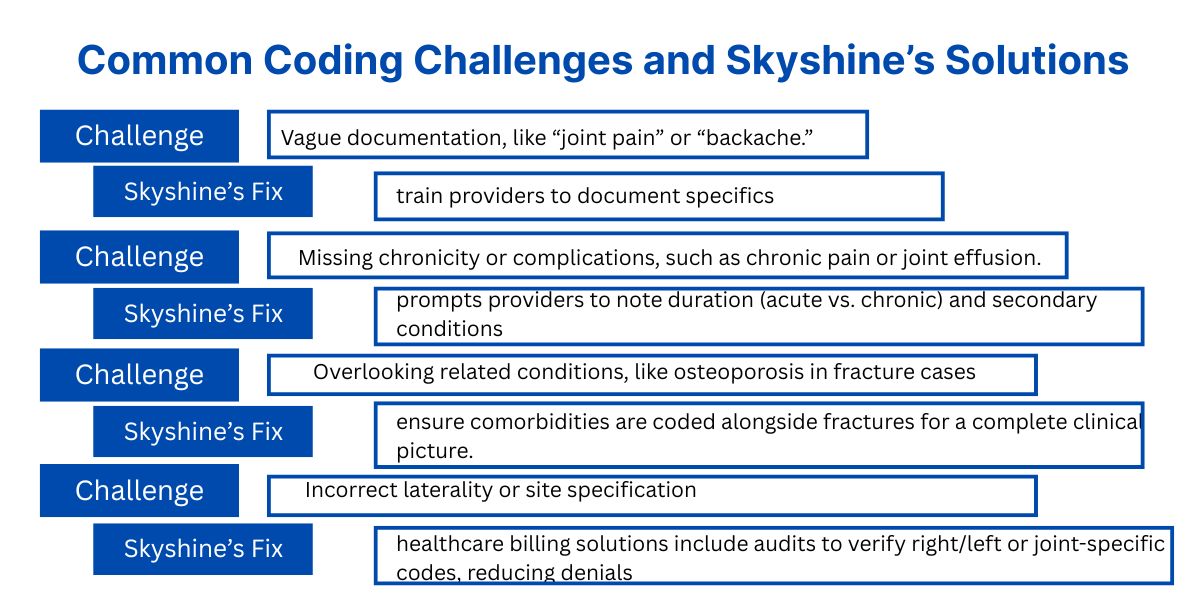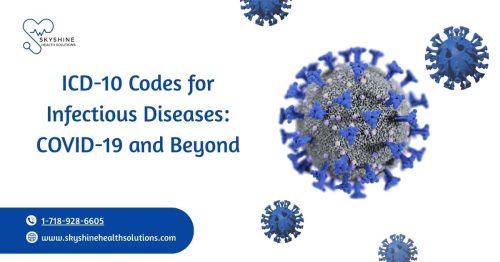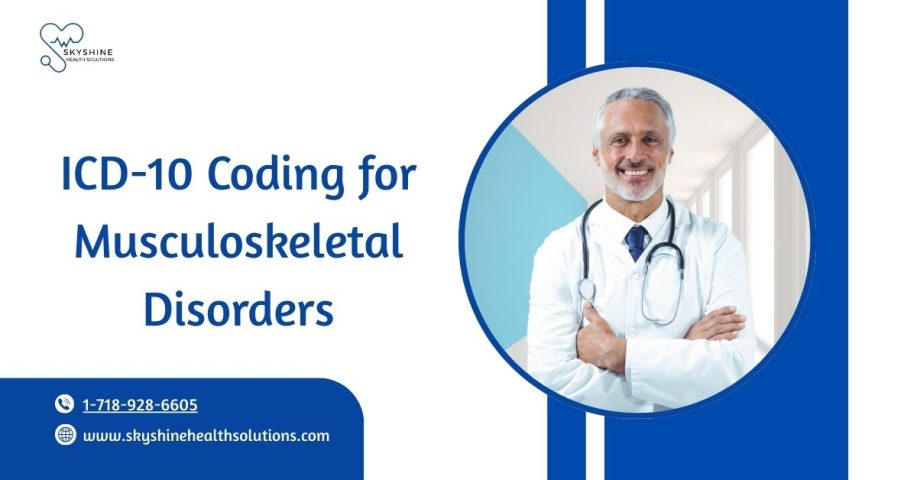
ICD-10 Coding for Respiratory Diseases: Complete Guide
September 3, 2025
ICD-10 Coding for Oncology: Accurate Billing with Skyshine
September 15, 2025At Skyshine Health Solutions, we understand that navigating ICD-10 codes for musculoskeletal disorders is a cornerstone of effective medical billing services. Conditions like arthritis, back pain, and joint injuries dominate orthopedic practices, and accurate medical coding and billing ensures smooth healthcare revenue cycle management. The ICD-10 M00-M99 chapter covers these disorders, but coding errors can lead to claim denials, delayed payments, or compliance issues. This comprehensive guide dives deep into why ICD-10 coding matters, breaks down key codes, shares expert tips, and highlights how Skyshine’s healthcare billing solutions empower providers to maximize revenue and focus on patient care.
The Critical Role of ICD-10 Coding in Musculoskeletal Disorders
Musculoskeletal disorders, including osteoarthritis, rheumatoid arthritis, and chronic back pain, affect millions, particularly older adults. These conditions account for a significant portion of healthcare visits, making precise coding essential for medical claims processing. According to the Healthcare Financial Management Association, 60% of claim denials stem from coding or eligibility errors, with 80% preventable through proper documentation. At Skyshine Health Solutions, we help providers avoid these pitfalls, ensuring claims are paid promptly and practices remain compliant with CMS and HIPAA regulations.
Accurate medical coding and billing does more than secure revenue—it enhances patient care. Proper coding ensures specialists understand a patient’s condition, guiding treatment plans like physical therapy or surgery. For example, coding osteoarthritis correctly can trigger insurance approval for joint injections, improving patient outcomes. Skyshine’s healthcare billing solutions streamline this process, reducing administrative burdens and letting providers focus on what matters: helping patients move better and live pain-free.
Understanding the ICD-10 M00-M99 Chapter
The M00-M99 chapter in ICD-10-CM covers diseases of the musculoskeletal system and connective tissue. It includes codes for arthritis, spinal disorders, joint pain, and soft tissue conditions. Specificity is key—codes must reflect the exact diagnosis, joint, laterality (left or right), and any complications. Without detailed documentation, claims risk rejection, costing practices an average of $117 per denied claim in rework, per the American Medical Association. Skyshine’s medical billing services ensure your documentation aligns with CMS requirements, minimizing denials.
Key ICD-10 Codes for Musculoskeletal Disorders
Here’s a detailed breakdown of essential codes for common musculoskeletal conditions, with tips to ensure accuracy:
1. Arthritis (M15-M19)
-
-
M17.0: Bilateral primary osteoarthritis of knee.
-
M17.11: Unilateral primary osteoarthritis, right knee.
-
M06.9: Rheumatoid arthritis, unspecified.
-
M05.79: Rheumatoid arthritis with rheumatoid factor of multiple sites without organ involvement.
-
Pro Tip: Specify the joint (e.g., knee, hip), laterality, and type (primary, secondary, or post-traumatic). For rheumatoid arthritis, note rheumatoid factor status to avoid vague codes like M06.9.
-
2. Back Pain and Spinal Disorders (M50-M54)
-
-
M54.5: Low back pain, unspecified.
-
M51.36: Other intervertebral disc degeneration, lumbar region.
-
M50.20: Other cervical disc displacement, unspecified cervical region.
-
Pro Tip: Document the spinal region (e.g., lumbar, cervical) and cause, like disc herniation or spondylosis, to support specific codes. Avoid M54.5 unless absolutely necessary, as payers prefer detailed diagnoses.
-
3. Joint and Soft Tissue Conditions (M20-M79)
-
-
M25.50: Pain in unspecified joint.
-
M79.1: Myalgia.
-
M75.51: Bursitis of right shoulder.
-
Pro Tip: Specify the affected joint or muscle and any underlying causes, like overuse or injury, to justify codes like M75.51 over vague ones like M25.50.
-
4. Fractures and Injuries (M80-M84, S00-T88)
-
-
M80.08XA: Age-related osteoporosis with current pathological fracture, vertebra(e), initial encounter.
-
S93.401A: Sprain of unspecified ligament of right ankle, initial encounter.
-
Pro Tip: For fractures, note whether they’re pathological or traumatic and include the encounter type (initial, subsequent, or sequela).
-
Skyshine’s Expert Tips for Accurate Coding
To optimize healthcare revenue cycle management and reduce denials, Skyshine Health Solutions recommends these strategies:
-
-
Prioritize Specificity: Document the exact joint, side, and condition details. For example, “right knee osteoarthritis with effusion” supports M17.11 and M25.461, ensuring accurate medical claims processing.
-
Leverage Combination Codes: Use codes like M19.0 for osteoarthritis with joint deformity to capture complexity in a single code.
-
Include Comorbidities: Note related conditions, like obesity (E66.9), diabetes (E11.9), or smoking (Z72.0), that impact musculoskeletal care and justify additional codes.
-
Use Diagnostic Evidence: Rely on imaging (e.g., X-rays, MRIs) or clinical findings to confirm diagnoses. For instance, an MRI showing lumbar disc degeneration supports M51.36.
-
Stay Updated on Codes: CMS updates ICD-10 annually, often refining musculoskeletal codes. Skyshine monitors these changes to keep your practice compliant.
-
Collaborate with Skyshine’s Team: Our medical billing services review your documentation to ensure it supports the chosen codes, catching errors before claims are submitted.

-
The Broader Impact of Accurate Coding
Accurate ICD-10 coding for musculoskeletal disorders goes beyond medical claims processing—it transforms patient care and practice efficiency. For example, coding M17.0 for bilateral knee osteoarthritis ensures specialists prescribe appropriate therapies, like hyaluronic acid injections, covered by insurance. It also supports population health studies, tracking arthritis prevalence to inform public health strategies.
Skyshine’s healthcare billing solutions reduce denials, which cost practices millions annually. A 2023 study by the Healthcare Financial Management Association found that 60% of denials are linked to coding errors, with 80% preventable through proper documentation. By partnering with Skyshine, providers save time, boost revenue, and focus on patient care instead of paperwork.
How Skyshine Health Solutions Makes a Difference
Skyshine Health Solutions specializes in healthcare revenue cycle management, offering end-to-end medical billing services that streamline coding and billing for musculoskeletal disorders. Our experts audit documentation, train providers on ICD-10 best practices, and monitor CMS updates to ensure compliance. We reduce the administrative burden, letting you prioritize patient outcomes. Whether it’s catching vague codes or ensuring laterality, Skyshine’s tailored approach maximizes claim approvals and revenue.
At Skyshine, we pair ICD-10 coding with robust eligibility verification to prevent denials. Verifying insurance coverage upfront ensures services like joint injections or spinal surgeries are covered, aligning with codes like M17.0 or M51.36. This proactive step, part of our healthcare billing solutions, saves practices from costly rejections and enhances patient trust by avoiding surprise bills.
Partner with Skyshine for Seamless Billing
Mastering ICD-10 coding for musculoskeletal disorders is essential for efficient medical claims processing and exceptional patient care. With Skyshine Health Solutions, you get expert medical billing services that ensure accurate coding, fewer denials, and optimized revenue. Let us handle the complexities of the M00-M99 chapter so you can focus on helping patients move better and live healthier. Contact Skyshine Health Solutions today to transform your healthcare revenue cycle management!

Learn more on ICD-10 Codes for Infectious Diseases: COVID-19 and More
Have Question? Visit our Medical Billing FAQs















